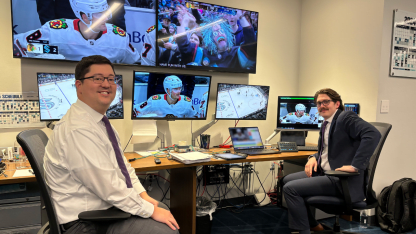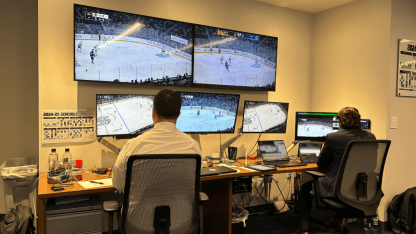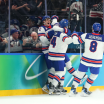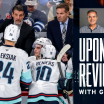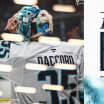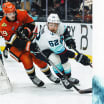“Brady doesn’t miss much in real-time,” Ohashi said.
By the second intermission, the computer drives are again at each coach’s desk. This time, assistant Dave Lowry has a lone penalty kill to review while Campbell has a couple of power plays.
It’s a lower-key night for Ohashi and Morgan than the previous week’s road trip.
They got a goal overturned in Boston on a missed zone entry offside, then replicated that in Colorado just two days later. It was nearly a rare back-to-back triumph worthy of inclusion on any video coaching resume.
But once the Kraken challenge in Colorado was upheld, the Avalanche immediately protested the “offside” came on a puck Yanni Gourde initially dumped towards Colorado’s net and that slid all the way around the boards and back down the ice again.
Only then did the Colorado forward Artturi Lehkonen cross the Kraken’s blue line a full stride ahead of the puck. According to NHL rules, a player isn’t offside if the opposing team intentionally directs the puck over their own blue line.
It took several confusing minutes before everything was settled. The goal stood and the Kraken were assessed a minor penalty for technically losing the challenge despite the initial ruling in their favor.
Ohashi and Morgan had never seen anything like it. They began to get worried when, after officials announced to the crowd that the goal was no good, they didn’t immediately drop the puck again.
“I thought maybe they were arguing the faceoff location,” Ohashi said.
But they could see the referee hovering around the penalty box with the headset still on -- which suggested they were reviewing additional footage.
“We warned the bench probably a couple of minutes before they ruled that ‘Hey, there’s a chance that they’re going to amend this ruling,’” Ohashi said.
Ohashi and Morgan quickly checked the NHL rulebook and correctly guessed Colorado was arguing Rule 83.1 stating: “If a player legally carries, passes or plays the puck back into his own defending zone while a player of the opposing team is in such defending zone” the offside is nullified.
They immediately communicated with Campbell and suggested counterarguments – that Gourde hadn’t intentionally played or directed the puck towards his own end and that Lehkonen wasn’t already in the Kraken’s zone but had skated into it just ahead of the puck.
But those arguments didn’t prevail. And despite getting the initial offside part right, seeing the goal upheld and a penalty called against the Kraken wasn’t fun.
“You definitely don’t feel good about that,” Ohashi said. “I mean, you’re happy they didn’t score on the ensuing power play and that nobody blocked a shot and broke a foot or anything like that.
“But obviously, in a perfect world, if we knew they were going to rule that way then we wouldn’t have challenged.”
Interestingly, the duo’s greatest triumph also came in the very same Ball Arena two springs ago in Game 7 of the opening playoff round. Nathan MacKinnon had just scored a tying third-period goal for Colorado but Ohashi and Morgan knew right away the initial zone entry was offside.
“We call that a ‘tap-in’,” Morgan said of the relatively easy call.
Initially, the Ball Arena crowd’s reaction to the goal was so loud they couldn’t tell whether coaches had heard them over the headset. So, as a backup, they sent a red banner alert with the word “Offside” to a bench-side video monitor and got the goal negated. The 2-1 score stood the rest of the way as the Kraken clinched the series.
The prior game, they’d gotten a far closer offside called in their favor to eliminate an opening Game 6 goal by Bowen Byram of the Avalanche. They’d hastily reviewed several angles – all within the 20-to-30 seconds teams typically have to challenge goals – before finding supportive overhead footage.
The Kraken has had 13 of 18 challenges (74%) upheld in three-plus seasons, which is above the NHL average for that period of 68%.
And though they help initiate merely a handful of challenges a season, it’s often the only time Kraken fans hear about Ohashi and Morgan. Against the Blackhawks this time, their work will remain anonymous. The only challenges seen come on a coaches’ room television set showing a New York Islanders game against the Vancouver Canucks.
“You should have gone up to Vancouver to do a story on them,” Morgan quips to a visitor.
The Kraken start the third period by taking a 2-0 lead on the 200th goal of Jaden Schwartz’s career.
“I’ll text Jeff,” Ohashi said, indicating he’d let equipment manager Camelio know to keep the puck.
But Chicago soon cuts the lead in half.
Things get far more serious as the tight game heads into the final 10 minutes. Morgan tells Campbell via his headset: “Faceoffs are ready if you need them, Jess. Wright is 8-for-11 from the right dot.”
Indeed, Wright is enjoying one of his best faceoff nights. The information could prove critical in a one-goal game if the Kraken need a right-handed faceoff win.
“That’s what we have here,” Morgan said, holding out a customized Stream Deck control panel where he charts faceoffs that are relayed automatically into the duo’s computers to pair with matching video. “And if Dan (Bylsma) just wants to see all of our (video) views on (faceoff) wins, then Tim (Ohashi) can just rifle that off for him.”
It turns out Wright won’t be needed for any critical faceoffs as Brandon Tanev scores into an empty net to clinch a 3-1 victory.
“We have a good goal!” Morgan shouts into his headset. “A good goal!”
And a good night for the video staff that no fans outside of the room will need to hear about.

